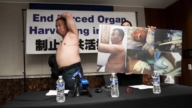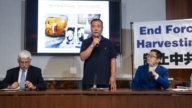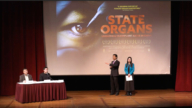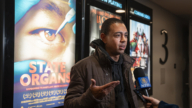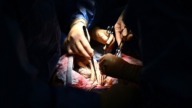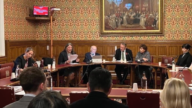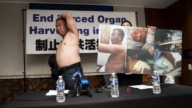【新唐人2012年12月08日訊】中國大陸器官移植背後的人權侵犯來源越來越引起國際社會的關注,在歐洲議會12月6日舉行的中國人權聽證會上,議員、歐盟官員、非政府組織代表以及專家學者討論了中國器官移植和摘除背後的人權迫害,各界人士呼籲國際社會應對此採取更強硬立場。
按照國際慣例,器官移植的來源通常是個人捐獻,在中國傳統觀念影響下,願意捐獻器官的人本該數量有限,然而中國大陸公布的器官移植案例數量卻高得驚人。
歐盟對外事務部中國事務副主管喬治•坎寧安(Goerge Cunningham):“歐盟特別關注圍繞著死刑和器官移植的統計數據的謎團,這也讓外界無法確知,用於移植的器官來源,以及器官是否是從囚犯,特別是勞教所囚犯的身上摘取的。”
在外界質疑下,中共先是拒絕對此發表任何評論,後來在國際社會的壓力下,承認這些器官來大部分自死刑犯,但這樣的答案並不能讓國際社會滿意。
國際大赦中國問題研究員科琳娜•芭芭拉•弗朗西斯(Corinna-Barbara Francis):“首先,哪怕器官是從死刑犯身上摘取的,這已經是不道德的了,我們不相信在死亡綫上等待的中國囚犯,能自由選擇是否願意捐獻器官。”
然而,越來越多的證據卻顯示,器官的來源不光是將死之人,更存在從活人身上摘取器官的行徑。
國際大赦中國問題研究員科琳娜•芭芭拉•弗朗西斯(Corinna-Barbara Francis): “有不少團體是這些器官的來源,法輪功是其中最主要來源之一。有很多事情提供了支持性的證據,證明活摘器官的事情曾經發生過,並且可能還在發生。”
曾獲2010年諾貝爾和平獎提名的加拿大律師大衛.麥塔斯和加拿大前亞太司司長大衛.喬高,就此事進行了獨立調查,並得出結論:活摘法輪功學員器官的事情是存在的,已有數千人因此被殺害。
加拿大律師大衛•麥塔斯:“法輪功是目前中國人權虐待最嚴重的的受害者,按道理講,最嚴重受害者應該得到最多的關注,最優先被考慮。”
大衛•喬高先生曾在2009年12月的歐洲議會有關中國人權的聽證會上,就中共系統性活摘法輪功學員器官的行爲做報告。
歐洲議會副主席愛德華•麥克米蘭斯考特(Edward McMillan-Scott):“這是一個那麼令人恐怖的指控,所以很多人選擇不敢相信,我堅持認為人們應該相信,我們就是來支持這一點的,那就是這是一種群體滅絕的行徑,而且正在中國發生。”
歐洲議會在2010年5月通過一項行動方案(action plan),要求歐盟委員會就活體摘取法輪功器官及其他相關案例進行調查,並向歐洲議會和歐盟理事會提交報告。但兩年多過去了,這份報告沒有出臺。
歐盟對外事務部中國事務副主管喬治•坎寧安(Goerge Cunningham): “歐盟已經在過去的幾輪歐中人權對話中指出了摘取器官的問題。”
歐盟對外事務部表示,他們的做法是,告訴中共,注重法制和人權會給中國帶來穩定和發展(stability and progress)。然而這樣的舉措,顯然不能讓在坐議員滿意。
歐洲議會荷蘭籍議員泰斯•比爾曼(thijs berman):“如果你聼歐盟對外事務部剛才講的,你認為他們的措施能是有效的,並且會給我們希望看到的結果嗎?我們希望看到有效的措施來反對酷刑,有效的措施來反對隨意關押,有效的措施來反對這種非法的器官買賣。”
中國民主人士期待國際社會能夠聯合起來,採取更有力的立場。
中國憲政民主運動領袖楊建利博士:“我覺得最重要的問題就是,直接打破這個迷思就認為國際社會會受到中國政府的懲罰如果是在人權問題上表示強硬的話。這個是沒有證據的,所以呢,首先要打破這個迷思,打破這個恐懼。然後和中國政府打交道的時候能夠表示出了很強硬的一種人權的態度。”
國際大赦也看到,這樣做才是真正行之有效的方法。
國際大赦中國問題研究員科琳娜•芭芭拉•弗朗西斯(Corinna-Barbara Francis):“我認為,公開的探討以及在公開場合曝光這些事情,才真正能給中共施加壓力。他們可能反彈很厲害,他們也真是這樣,感覺被冒犯了,但是我們真的看到,這樣做能起到效果。”
歐洲議會議員們表示,他們會持續努力,繼續做他們應該做的。
歐洲議會立陶宛籍議員萊昂尼達斯(Donskis Leonidas):“我們必須髮出強有力的訊息,那就是(活摘器官)是無法接受的,歐盟在未來的幾十年,甚至幾個世紀都不可能接受這種事情,這種事越過了紅線,所以我們不能夠容忍這種事情發生。”
各界人士均要求國際社會採取更強硬措施,調查並制止活摘器官的行徑。
採訪/撰稿/剪輯 李月
European Parliament (EU) Hearing on Live Organ Harvesting
Human rights violations of organ transplant sources in China
are causing increasing concerns of the international community.
On Dec. 6, a hearing was held in the European Parliament on
China’s human rights.
EU Parliament members, officials, representatives of non-
governmental organizations, experts and scholars discussed
human rights abuses behind organ transplants and removal
in mainland China.
People from all walks of life called on the international
community to take a tougher stance.
In accordance with international practice, the source of
organ transplants usually is from personal donation.
Under the influence of the traditional Chinese concepts,
few are willing to donate organs.
However, in China, the announced number of
organ transplant cases is surprisingly high.
[George Cunningham, Deputy Head of China Division, EEAS]:
The European Union is particularly concerned the secrecy
which surround both death penalty and organ transplant statistics.
This makes it impossible to gain an accurate picture of the
source of transplanted organs.
It also makes it impossible to deal with the allegations that
many organs are harvested from prisoners.
In particular in prisoners in “re-education through labors camps”.
Facing skepticism from outside, the Chinese Communist
Party (CCP) first refused to make any comment.
Later on under the pressure from the international community,
it admitted most of these organs came from death row inmates.
This answer is not good enough.
[Corinna-Barbara Francis, Researcher, Amnesty International]:
“First, even if they are taken from executed prisoners, this is unethical…
We do not believe that prisoners on death row in China have
any ability to freely choose to donate their organs.”
However, increasing amounts of evidence shows the source of
organs is not only the death row inmates, but also organ harvesting from living people.
[Corinna-Barbara Francis, Researcher, Amnesty International]:
“There are many groups that these organs may be taken from, the Falun Gong being one of the main groups.
There are many things that provide supporting evidence that
this may have occurred and may still be occurring.”
David Matas, the 2010 Nobel Peace Prize-nominated
Canadian lawyer and David Kilgour,
the former Canadian Secretary of State for
Asia-Pacific affairs independently investigated.
They concluded organ harvesting from living Falun Gong
practitioners exist, and thousands of them had been killed.
Matas: “Falun Gong are by far the number one victims of
human rights violations in China.
In principle, the worst victims need to give the most attention
(with) the highest priority."
Mr. David Kilgour reported on the systematic organ harvesting
from living Falun Gong practitioners by the CCP in a European
Parliament hearing on human rights status in China in Dec. 2009.
[Edward McMillan-Scott, VP of European parliament]:
“It is such a horrific proposition that many people choose not to believe it.
I insist they should, and we are here to sustain the belief that
this is genocide activity, and it’s taking place today in China.”
In May 2010, the European Parliament adopted an action plan.
They asked the European Commission to investigate live organ
harvesting on Falun Gong practitioners and other related cases.
Then submit a report to the European Parliament and
the Council of the European Union.
But more than two years have passed,
the report is not yet finished.
[George Cunningham, Deputy Head of China Division, EEAS]:
“The EU has already made this point (about organ transplantation)
in the past work around the EU-China Human rights dialogue.”
EU Foreign Affairs said that their practice is to tell the CCP by
focusing on the rule of law and human rights, it will bring stability and progress in China.
But such initiatives, however, apparently
can not let the EP members be satisfied.
[Thijs Berman, Dutch MEP]: “if you hear the EEAS speaking
just now, do you think that this approach is appropriate and
will bring the best results we would like to see?
We hope to see effective actions against torture,
arbitrary detention, and the illegal organ traffic.”
Democrats in China expect the international community
to unite and take a more forceful stance.
Chinese constitutional democratic movement leader,
Dr. Yang Jianli: “The most important issue is to break the myth that
the international community will be punished by the Chinese
government if they are tough on human rights issues.
This saying has no evidence. So first is to break this myth and
remove the fear.
When dealing with the Chinese government, show a very
hard-line attitude on human rights issues.”
Amnesty International also see it is a truly effective way.
[Corinna-Barbara Francis, Researcher, Amnesty International]:
“My sense is that, public discussion and exposing things in a
public forum is really what does push (the CCP).
They may react madly, and they did, they systematically feel
offended, but we do see that that takes effect.
European Parliament members said they will continue to
work hard, and do what they should do.”
[Leonidas, Lithuanian MEP]: “We have to send a very strong
message that this (live organ harvesting) is unacceptable.
The EU would not accept such a thing in the coming decades
or centuries. So we cannot tolerate this is happening.
People from all backgrounds asked the international community
to take tougher measures to investigate and suppress practices of live organ harvesting.


